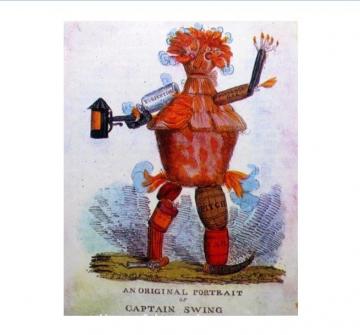Swing Riots and Cliddesden Convicts, 1830-1

In the winter of 1830 unrest amongst agricultural workers spread across southern England in the face of ‘grinding poverty’.[1] Wages were low, the price of bread high and the new threshing machines were seen as a threat to employment. Groups of men moved from farm to farm demanding higher wages and, in some cases, set fire to hay ricks and destroyed threshing machines. Letters were circulated signed by ‘Captain Swing’, the name that became associated with these short-lived but potentially revolutionary events.
Men from Cliddesden were involved in two incidents. The first was on Friday 19th November when John Gold and William Astridge acted as spokesmen for a mob of some 50 labourers at Down Grange, Basingstoke, demanding money from the widow Cassandra Hankey. This was resolved peacefully with the gift of a guinea, whisky and water for all concerned and a promise by Mrs. Hankey’s bailiff to write next day to the farmers on their behalf.[2]
The second incident –with far more serious consequences - took place on the following Monday, the 22nd. On this day Charles Bulpitt (25), John Bulpitt (23) and their younger brother Henry, together with George Clarke (25) and James Cook (28) were involved in a ‘great riot and disturbance’ at Wotton St Lawrence and again on Tuesday 23rd at Monk Sherborne during which sums of two sovereigns, one sovereign and a £5 promissory note were ‘stolen’.[3]
Government reaction to these riots was swift and fierce. A Special Commission was appointed to deal with the rioters in those counties most affected and the first trial took place in the Great Hall, Winchester on 20th December. Henry Bulpitt was acquitted, but Charles and John Bulpitt, George Clarke and James Cook were sentenced to death, only later commuted to transportation for life (the Bulpitts) or for 14 years (Clarke and Cook).[4]
The men were moved from Winchester Goal to the prison hulk York at Portsmouth before sailing to New South Wales on the convict ship, the Eleanor. She sailed from Spithead on the 19th February 1831. Wives and families left behind became dependant on the parish. Esther , wife of John Bulpitt died in March 1832 (aged 20) and was buried in Cliddesden.[5] Elizabeth Cook was granted a free passage to join her husband at Parramatta, NSW, in May 1832 on the intervention of a local magistrate.[6] She later appear s to have returned to Cliddesden.
[1] Kent, David, Popular Radicalism and the Swing Riots in Central Hampshire, Hampshire Papers, 1997, p.1.
[2] Chambers. Jill, Hampshire Machine Breakers The story of the 1830 Riots, Letchworth, 1996 , pp. 29 & 30.
[3] Chambers, Jill, Rebels of the Fields, Robert Mason and the convicts of the Eleanor, Letchworth , 1995, pp.137,
138, 155, 157.
[4] Ibid.
[5] Ibid, p. 109.
[6] Ibid. p.157
Content derived from research undertaken as part of the Victoria County History project


